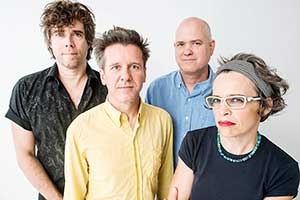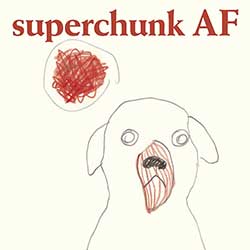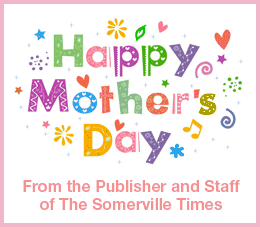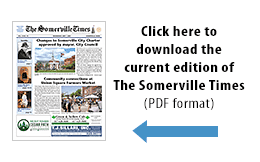
Superchunk will be presenting a live acoustic show commemorating the 25th anniversary of the release of their album “Foolish.”— Photo by Lissa Gotwals
By Blake Maddux
As the cofounder of both the Chapel Hill quartet Superchunk and the venerated record label Merge, each with Laura Ballance, Mac MacCaughan’s credentials as the embodiment of American indie rock and its DIY ethos are beyond reproach.
2019 marks the 30th anniversary of the band and the label, as well as the 25th anniversary of Superchunk’s fourth LP, Foolish. To honor the occasion, McCaughan and his bandmates recorded an acoustic version of the album – titled AF (Acoustic Foolish) – and performed the whole of it on two nights at the Evanston, IL venue SPACE.
“That was the test run, and it worked really well,” McCaughan said in an interview with The Somerville Times that continues below.
So well that the band put together a four-city Acoustic Foolish tour that includes a visit to Somerville Theatre on November 6. The onstage lineup will comprise McCaughan, lifelong members Jim Wilbur (guitar) and Jon Wurster (drums), touring bassist Jason Narducy, and Matt Douglas, who appears on AF, on saxophone and keyboards.
The Somerville Times: The 25th anniversaries of No Pocky for Kitty and On the Mouth have both happened in the past five years. Why is Foolish the first such occasion that you are celebrating with a rerecording and a tour?
Mac McCaughan: I guess part of this reason is we’ve had other new records out around the time of these other reissues. If it’s a 20th anniversary or something like that, it’s always a good time to do a reissue if something’s been out of print. Foolish was not out of print, but we were trying to think of interesting things to do for the Merge 30th anniversary. So we had a subscription series where people could subscribe to get vinyl in the mail all year of previously unreleased stuff from Merge artists. They didn’t know what they were getting. And so we thought it made sense for one of those things to be by Superchunk, but we couldn’t figure out whether it should be a live album or whether we should just record a bunch of our songs acoustically or something. So we were just going through all these different concepts and we realized that it lined up with the 25th anniversary of Foolish. In some ways, recording a whole album acoustically seemed more interesting and less commonly done than just acoustic versions of songs from different records. That’s why we decided to do that.
TST: Do you think that Foolish lends itself particularly well to an acoustic rendering?
 MM: When we put out Foolish in the first place, the reaction was largely, “Whoa, this album sounds so different. The guitars are clean and the songs are slower.” So part of the idea in doing the acoustic version of the whole Foolish album was to record something that sounded like people acted like Foolish sounded. You know what I’m saying? As though it were really as radical as people acted like it was when we put it out back then. When I listen to Foolish now, yes it starts with a slow song, Like A Fool, which was unusual for us, and there are acoustic guitars on it and things. But to me, it’s not really as different from our first few records as people made it out to be then. We kind of set out to do this recording that was like, what if it really sounded as different as people thought it did? And it was really fun to do. A lot of these songs we not only have never played acoustically but we’ve never even played live ever since we made the record. A couple of those, In a Stage Whisper and Saving My Ticket, ended up being some of my favorite recordings on Acoustic Foolish just because they had a new life and a different sound. They’re fun to play live now and I think they’re enhanced by strings and the saxophone that you hear on there.
MM: When we put out Foolish in the first place, the reaction was largely, “Whoa, this album sounds so different. The guitars are clean and the songs are slower.” So part of the idea in doing the acoustic version of the whole Foolish album was to record something that sounded like people acted like Foolish sounded. You know what I’m saying? As though it were really as radical as people acted like it was when we put it out back then. When I listen to Foolish now, yes it starts with a slow song, Like A Fool, which was unusual for us, and there are acoustic guitars on it and things. But to me, it’s not really as different from our first few records as people made it out to be then. We kind of set out to do this recording that was like, what if it really sounded as different as people thought it did? And it was really fun to do. A lot of these songs we not only have never played acoustically but we’ve never even played live ever since we made the record. A couple of those, In a Stage Whisper and Saving My Ticket, ended up being some of my favorite recordings on Acoustic Foolish just because they had a new life and a different sound. They’re fun to play live now and I think they’re enhanced by strings and the saxophone that you hear on there.
TST: Many bands either rerelease an album or perform it live in its entirety to observe an anniversary. Why did you decide to do both?
MM: I think it was just realizing that it worked once we recorded it and feeling like it would be weird to spend the time making this thing that we really are happy with and just kinda drop it out there and not promote it any way. We’ve never done the play-an-album-start-to-finish thing, and I’ve always been ambivalent about that as a fan, really, because I like being surprised by what someone’s gonna play. But I guess in this format the whole thing’s kinda surprising because it’s all-acoustic arrangements of these songs that Superchunk fans know really well and then a lot of songs that they probably haven’t heard since the record came out. Some of the more deep cuts are interesting to hear this way and maybe it will send people back to the original record.
TST: What are some of the challenges that accompany an acoustic show?
MM: For me the challenge is always singing and playing these songs that were written on an electric guitar and then figuring out how to play them on acoustic guitar. We’ve kind of rearranged them to make that part feasible. But when you’re playing a loud electric show and jumping all around and there’s a lot of noise happening and loud drums and stuff, there’s a lot to cover up your mistakes. But that’s not really there when everything is kinda quiet and delicate sounding. So getting over the stress of that and just trying to settle into just knowing that if you [expletive] up people are gonna hear it! Also, if you’re used to going on stage and then kinda jumping around for an hour and a half, it’s a different kind of energy and I think you kinda have to prepare for that in a way. To be sitting down and trying to enjoy that part of it as opposed to enjoying the kind of aerobic aspect, which is what I’m normally enjoying. So it is weird to finish a show and not just be completely soaked in sweat and exhausted. It’s a different kind of exhaustion.
TST: Might you commemorate next year’s silver anniversary of Here’s Where the Strings Come In with an acoustic version of it?
MM: That’s a good idea. You know we recorded that record in Somerville at Fort Apache. When we made Here’s Where the Strings Come In, we recorded an acoustic version of Detroit Has a Skyline as a B-side for Hyper Enough. That was really the first time that we had recorded and released an acoustic studio recording. A lot of people really like that version of that song, in fact. We haven’t done it with the rest of that album, but how do you record an acoustic version of a song like Certain Stars? You don’t know until you try.
Superchunk with Torres, Wednesday, November 6, at the Somerville Theatre, 55 Davis Square. Doors at 7:00 p.m., show at 8:00 p.m.
















Reader Comments